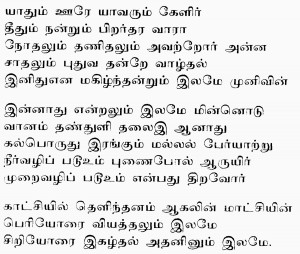By Kollengode S. Venkataraman
Many of you may know that Tamil devotional literature – over 10,000 verses composed by Saiva and Vaishnava poets between 4th and 10th centuries AD — was the trigger for the Bhakti poetry in all Indian languages in later centuries that forever enriched and defined the Indian psyche.
Even before the advent of the Bhakti poetry, anthologies of secular Tamil poems written between 1st and 4th centuries AD are in what is called the Sangam Literature. One well-known is Aga-Naanooru (literally, Internal-400) with sensual love as its motif. The second is Pura-Naanooru (or External 400) focusing on events outside the love life of people. The “400†is the approximate number of verses in the anthologies.
Pura-naanooru’s poems describe the valor, generosity, even tyranny, of kings. The poets advise kings against going to war, mediate fights between neighboring kings, criticize kings on the excesses of corrupt officials, admonish kings to be loyal to their wives and not philander, exhort people to be benevolent — the same themes we see in public life today. Many are also sycophantic, jingoistic, and describe poverty among people — traits that are common today as well.
However, one poem in Pura-Naanooru by Kaniyan Poonkunran, known to those familiar with Tamil classics, stands out. This poem is breathtakingly fresh and “modern†given that it is written over 1800 years ago. Here is Prema Venkataraman’s attempt to versify the poem from its literal translation:
Every hamlet is my village and all are my kin; Good and bad are caused not by others herein. Natural is the flow of angst, And the happy event next. Through all of which we know, Death is nothing new.  So happy events do not make us exultant; And difficulties neither make us despondent.  “The rain batters the hill with lightning and thunder; Rain drops become streams, and thence to a gushing river. As the river meanders, the canoes go with its flow. With the ebb and flow of life, like the canoes we go.† This we learned from the wise among us. So we neither gape with awe at those who are famous; Better still, nor we disdain those who are nameless. ÂKaniyan Poonkunran’s opening words resonate well in today’s globalized world. Better still, in a world given to adulation of wealth, success, power, and fame, his words towards the end make us think, guiding us on how we need to model our lives. Here is the original for those who can read Tamil:
